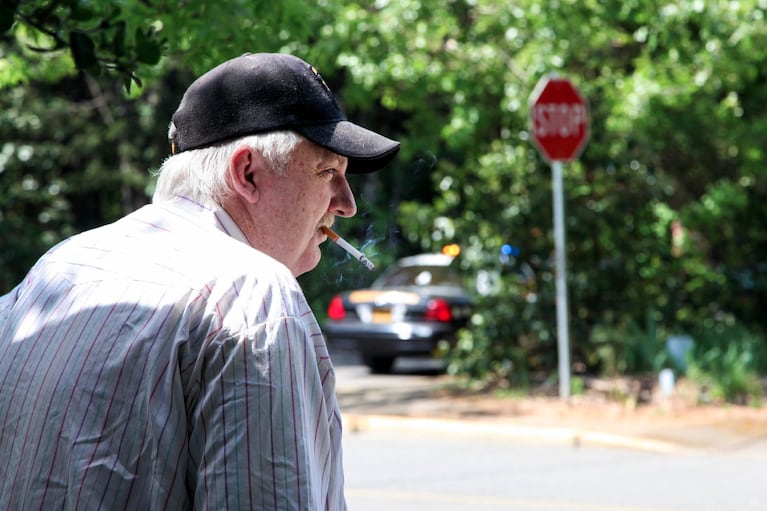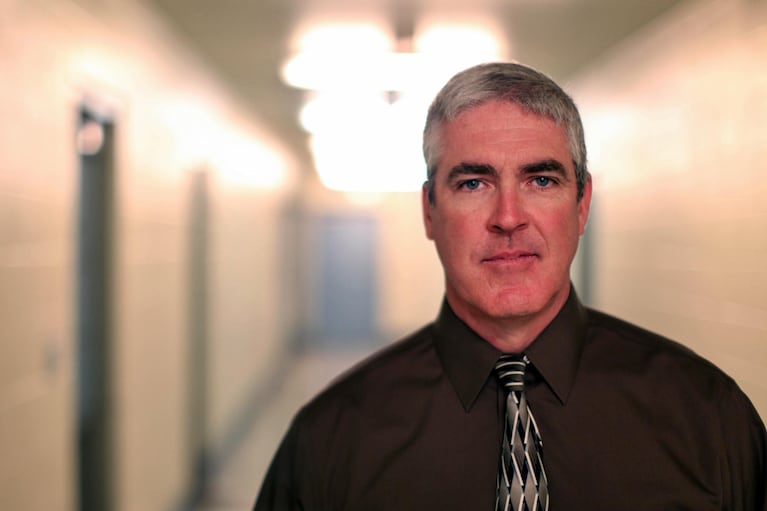
Cave Junction resident George Sheldon watches a neighbor get arrested by the Josephine County Sheriff — a rare sight, he says. The suspect, Edith Haney, was booked into the county jail for unlawful possession of a weapon, and unlawful possession of methamphetamine.
Dave Blanchard / OPB
REPRESENTED
Think Out Loud is traveling to cities and towns across the state to hear about the policy issues that matter to Oregonians. How do the decisions of lawmakers in Salem affect our lives? See our full coverage here.
"We're at a situation right now where justice always isn't served," says Josephine County Sheriff Dave Daniel. Three years ago, the sheriff's office laid off 23 deputies. He now has six deputies at his disposal, who are on patrol for only 10 hours a day.
And jail space is limited. Most offenders who are arrested for non-violent offenses are released within days. "They can go out and smash a window out of a car ... and they're going to get a ticket for it, they're not going to get brought in," says Daniel. The same is true for people driving under the influence of intoxicants. "They're not necessarily going to get brought in except for the intoxilyzer, and then they're going to get a ticket."
On Tuesday, voters again rejected a levy that would have increased funding to the sheriff's office. Measure 17-66 was the county's fourth attempt since 2012 to raise property taxes to pay for law enforcement. Only 46 percent of voters supported the levy.

Josephine County Sheriff Dave Daniel.
Dave Blanchard / OPB
Currently, property taxes are 58 cents per $1,000 assessed value — one of the lowest rates in the state. The levy would have increased that by $1.40 — higher than last year's proposed $1.19 increase. But proponents had argued that this measure would satisfy local desires better than any past attempt. They brought in outside policy experts S.R.I. Consulting to poll voters to find out what specific services they want from the sheriff.
It would have added 16 new deputies to the six they already have, increased the county's jail beds from 100 to 160, and re-opened Josephine County's shelter and detention facility for juveniles.
Daniel says he’s hoping not too much will change in the near-term. "We’re hoping to remain at status quo.” Federal subsidies known as timber payments are expected to come through early next month, and may add around $2 million to the budget.
But those payments get smaller every year, and may eventually run out. Daniel says that if that happens next year, “I’m going to be forced with an option basically of either closing this jail and trying to outsource some jail beds somewhere or possibly just closing and shutting down my patrol division altogether.”
How Bad Has It Gotten?
When environmental laws dramatically slowed the pace of logging in the county in the 1990s, Josephine County's economy took a big hit and it has never really recovered. Federal subsidies were able to blunt the impact to some degree, but as those payments dwindle, many county services, including the sheriff’s office, have had to make drastic cuts.
But some residents think elected officials have not done enough to improve the plight of the county. Vivian Kirkpatrick-Pilger is president of Josephine County Republican Women. She opposed the measure, in part because she was skeptical it would live up to its promises. She did some calculations on her own, and said it looked like the funding would come up short.
Kirkpatrick-Pilger was also opposed because of her own finances. She had to take an early retirement for medical reasons, and her husband has only had intermittent work since the financial crisis. "It's not good ... I really can't afford to pay an increase in tax."
And she's not alone. "We have a lot of poor people here (and) a lot of people who are underemployed," she observes — a problem she ascribes to the loss of the timber industry a couple decades ago. "Our county officials knew that was happening and they have done nothing at all to resolve those issues."

Vivian Kirkpatrick Pilger is president of Josephine County Republican Women. She had to take an early retirement for medical reasons, and her husband has only had intermittent work since the financial crisis. "It's not good...I really can't afford to pay an increase in tax." And she's not alone. "We have a lot of poor people here (and) a lot of people who are underemployed," she observes — a problem she ascribes to the loss of the timber industry a couple decades ago. "Our county officials knew that was happening and they have done nothing at all to resolve those issues."
Dave Blanchard / OPB
And some residents think the situation is not as bad as county officials make it out to be. Bill Hunker is a volunteer with JoCoAlert.com, which opposed the measure. "We do not have a crime crisis in this county," he says. "The crime crisis has been manufactured so that we'll pass a levy."
He points out that overall crime has been decreasing in Josephine County since the 90s, a trend that matches national and state data. "We're down to 7,300 crimes a year from 10,000 crimes a year in this county."
He and the sheriff have gotten into a public battle over crime stats. When Hunker points out that property crime in the region has gone down over time, Daniel counters that the numbers are from 2012 — the most recent state data. Things have gotten worse since then, the sheriff says, with the Oregon State Police receiving two-thirds more calls in 2014 than in 2012.
When Daniel observes that calls to the State Police Major Crimes team went up 850 percent over two years, Hunker says major crimes are a tiny fraction of all crimes and the sheriff is cherry picking his data.
When Law Enforcement Is 40 Minutes Away
The most common crimes in Josephine County are property crimes: theft and vandalism. Violent, person-to-person crimes are less common. But that doesn’t mean they don’t exist.
A report by OPB's Amelia Templeton brought this issue to national light back in 2013. In August 2012, a few months after the Sheriff's Office laid off 23 deputies, a woman called 911 and was routed to the Oregon State Police. She said that her ex-boyfriend was trying to break into her house. The dispatcher said there was nothing they could do to help.
Her ex, Michael Bellah, eventually made his way in, and assaulted and raped her.
Officials say it was an anomaly — that it happened when they were still working out how state police would take over certain responsibilities.

If the public safety levy were to pass, "it would keep me here," say Cathy Fulton of Cave Junction. "I could feel safe letting my kids go to the park." She came to Oregon fleeing her abusive ex-husband, who has been in and out of jail, and has tracked her down in the past. He's out of jail again, and she's nervous he might come back. Knowing the police could be a 40-minute drive away, Fulton says, "it's been really on the top of my mind to leave Cave Junction."
Dave Blanchard / OPB
But the question still remains: What resources are available to people at risk of violent crimes when police might not be available, or could be 40 minutes away?
It's a question Cathy Fulton of Cave Junction thinks about a lot. She came to Oregon fleeing her abusive ex-husband, who has been in and out of jail, and has tracked her down in the past. He's out of jail again, and she's nervous he might come back. Knowing the police are based out of Grants Pass, Fulton says, "It's been really on the top of my mind to leave Cave Junction."
She had another recent incident that increased her anxiety. She was the victim of a theft, but she hasn't followed up with the police. "If the police come and arrest them on theft charges, they're released the next day or even the following week and then come back to me because I called the cops on them," she explains. If that were to happen, "there's nobody right there to keep me safe, there's nobody to protect my children. I just feel I don't have an option."
The State's Role
State Rep. Carl Wilson's (R-Grants Pass) district includes much of Josephine County. "I've lived in Grants Pass since August of 1957, and this is not the community it was back in those days," he says. He was a reserve deputy back in the 1980s. "We had at least three people on every shift," he says, "and with reserves, like myself, you had as many as six." Even with those resources, "we were extremely busy."
Wilson voted for the public safety levy. "If there's no fear of the law here, we're going to continue to have some level of mayhem."
That said, he thinks it is up to the people to raise their taxes, and he resists any attempt for the government to step in and mandate higher taxes. He's against a state bill that would refer a constitutional amendment to voters to set a minimum property tax rate throughout the state of $2.00 per $1,000 assessed value. "I don't think that Salem ought to be running Josephine County. We need to make our own decisions."
Wilson introduced bills this session to urge Congress and the President to transfer federal public lands back to the state, but they didn't go anywhere. One of the few options he saw to improve the plight of the county was the public safety levy.
Prior to the election, he offered this ominous prediction of what would happen if the levy failed: "We'll continue to see a level of anarchy and it will continue to grow. Once people realize there's no jail — and it doesn't take the criminal network long to figure out that — it's just going to be business as usual and probably get worse."
Editor's note: This post has been updated to reflect the results of the election








